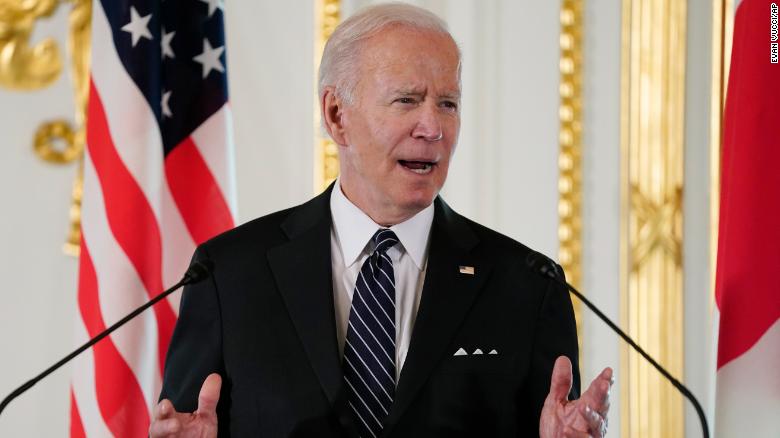US would defend Taiwan if attacked by China, says Joe Biden | Taiwan
www.theguardian.com
Joe Biden has said the US would intervene militarily to defend Taiwan if it came under attack from China – a statement that is likely to enrage Beijing as concern grows over Chinese military activity in the region.
Speaking in Tokyo on the second day of a visit to Japan, Biden said the US’s responsibility to protect the self-ruled island – which China considers a renegade province – was “even stronger” after Russia’s invasion of Ukraine, in one of the most forceful statements in support of Taiwan in decades.
“That’s the commitment we made,” Biden said, after he told his Japanese counterpart, Fumio Kishida, that Washington backed Japan’s permanent membership of a reformed UN security council and Tokyo’s plans to beef up its security with record levels of spending on defence, as it seeks to counter a nuclear-armed North Korea and an increasingly assertive China.
The US president said that any attempt by China to use force against Taiwan would “just not be appropriate … it would dislocate the entire region and be another action similar to what happened in Ukraine”.
Under the “One China” policy, the US acknowledges Beijing’s position that there is only one Chinese government and does not have diplomatic relations with Taiwan. But it maintains unofficial contacts with Taiwan, including a de facto embassy, and supplies it with military equipment.
“America is committed to a One China policy but that does not mean China has the jurisdiction to use force to take Taiwan,” Biden said, adding, “My expectation is that will not happen.”
Biden’s comments appeared to be a departure from the existing US policy of “strategic ambiguity” on its position on Taiwan, but shortly after he spoke a White House official said: “There is no change in US policy towards Taiwan. As the president said, our policy has not changed.”
The comments are likely to overshadow the centerpiece of Biden’s visit, the launch of an Indo-Pacific Economic Framework, a broad plan providing an economic pillar for US engagement with Asia.
His visit also includes meetings with the leaders of Japan, India and Australia, in the “Quad” group of countries.
www.theguardian.com
Joe Biden has said the US would intervene militarily to defend Taiwan if it came under attack from China – a statement that is likely to enrage Beijing as concern grows over Chinese military activity in the region.
Speaking in Tokyo on the second day of a visit to Japan, Biden said the US’s responsibility to protect the self-ruled island – which China considers a renegade province – was “even stronger” after Russia’s invasion of Ukraine, in one of the most forceful statements in support of Taiwan in decades.
“That’s the commitment we made,” Biden said, after he told his Japanese counterpart, Fumio Kishida, that Washington backed Japan’s permanent membership of a reformed UN security council and Tokyo’s plans to beef up its security with record levels of spending on defence, as it seeks to counter a nuclear-armed North Korea and an increasingly assertive China.
The US president said that any attempt by China to use force against Taiwan would “just not be appropriate … it would dislocate the entire region and be another action similar to what happened in Ukraine”.
Under the “One China” policy, the US acknowledges Beijing’s position that there is only one Chinese government and does not have diplomatic relations with Taiwan. But it maintains unofficial contacts with Taiwan, including a de facto embassy, and supplies it with military equipment.
“America is committed to a One China policy but that does not mean China has the jurisdiction to use force to take Taiwan,” Biden said, adding, “My expectation is that will not happen.”
Biden’s comments appeared to be a departure from the existing US policy of “strategic ambiguity” on its position on Taiwan, but shortly after he spoke a White House official said: “There is no change in US policy towards Taiwan. As the president said, our policy has not changed.”
The comments are likely to overshadow the centerpiece of Biden’s visit, the launch of an Indo-Pacific Economic Framework, a broad plan providing an economic pillar for US engagement with Asia.
His visit also includes meetings with the leaders of Japan, India and Australia, in the “Quad” group of countries.




